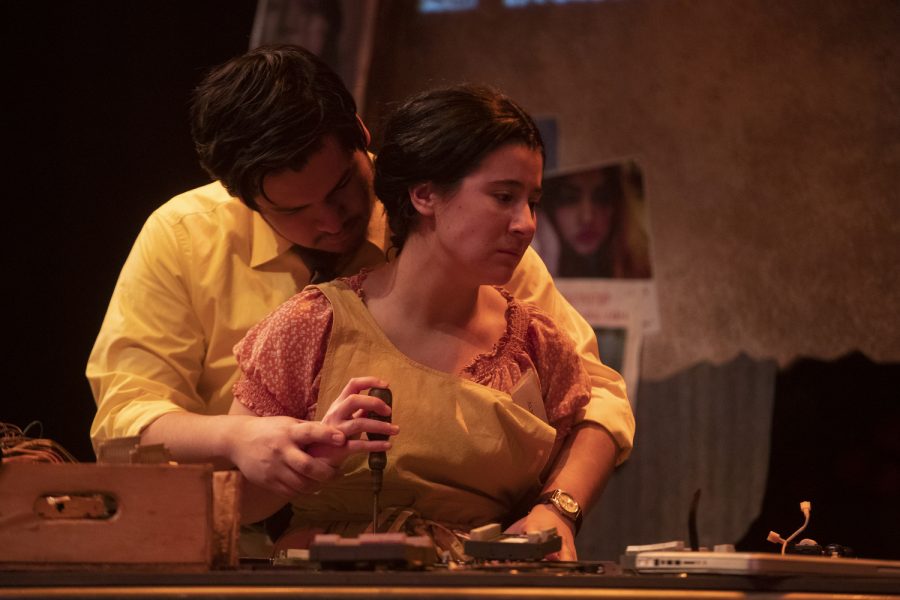Review | ‘Braided Sorrow’ a tribute to women silenced by femicide in Mexico
On Sunday afternoon, the University of Iowa Theatre Department presented ‘Braided Sorrow,’ a powerful and enlightening play about the women lost to femicide in Ciudad Juárez, Mexico.
Señor Fillmore, played by Johan Avila, helps Alma, played by Sara Alvidrez, with her work during a dress rehearsal for the University of Iowa theater department’s production of Braided Sorrow Thursday, Feb. 2, 2023.
February 7, 2023
Blue light bruised the dark stage where a young girl sat on a small box. She ran her fingers over her long braid before slicing it off with scissors.
The play “Braided Sorrow,” originally written by Marisela Treviño Orta and directed by Natalie Villamonte Zito, opened Feb. 5 in the University of Iowa Theatre Building’s David Thayer Theatre.
The UI Theatre Department will present “Braided Sorrow” through Feb. 11.
This play follows the story of Alma, a young woman who starts working in a factory in Ciudad Juárez near the Mexican-American border. Juárez is plagued by femicide, and no one is doing anything about it except a mythical Aztec spirit called La Llorona who appears to Alma and sends her on a journey to protect the women of Juárez.
Femicide is the killing of women or girls, in particular by a man because of her gender.
The performance began with La Llorona, played by performer Kat Guerrero, gliding across the rafters of the theater in a long white dress paired with the sound of dripping water. Her damp hair hung in wavy tresses down her back, and on her head perched a golden crown resembling the sun.
According to the information posted on the wall outside the theater, in popular culture, La Llorona was a woman who fell in love with a rich man. When he left her for another woman, she drowned their two children and herself. Legend says she still haunts bodies of water, crying for her children.
This tragic story differs slightly from original Aztec mythology. La Llorona was a ghostly woman walking through the city of Tenochtitlan after its fall. She was thought to be an omen associated with childbirth, fertility, and infanticide.
In the play, she was a supernatural protector of the women in the desert of Juárez. She mourned their deaths and gave a voice to the voiceless. When she saved Alma from a group of men, she set her on a dangerous mission to make the people of Juárez listen and take action to stop the femicide.
Alma, played by performer Sara Alvidrez, lived with her older brother, her brother’s wife, and her aunt. When she turned 16 years old, she started working in a factory that made and sold products like circuit boards and washing machines.
As the play went on, Alma was exposed to the intimidation and violence enacted against women in Juárez from men prowling the streets or from bosses in their workplaces. Her experiences were, unfortunately, very accurate representations of daily life for real women in Juárez.
The play is a beautiful and powerful story of resilience that hardly shies away from depicting the intense brutality and grotesque treatment of women in Juárez.
However, just as palpable were the depictions of familial love. Like her brother Carlos, Alma worked hard to send money home to her parents. Carlos was also working to help support his pregnant wife, who could no longer work.
The idea of family was one of the biggest themes of the play. As evil as the other male characters in the play might have seemed, Carlos, played by actor Orlando Lopez, was a good man who only cared about protecting his loved ones.
As the title of the play suggests, the symbol of a braid is notably important. Alma cuts it off as a form of self-defense, rebelling against the idea that a woman’s prettiness is power — an idea discussed during the panel. Her braid becomes essential to La Llorona’s mission to save the women of Juárez.
Another unique aspect of the play is that it was told out of order. It flashed between earlier events in Alma’s life and present day. This form offered relief from the dark subject matter, particularly presented during Alma’s present. It also created a circular story with a powerful conclusion that left me with chills.
This show would not have been near as impactful if it wasn’t for the amazing acting. The most emotional moments of the well-written play were exquisitely executed. I fought tears toward the end during Lopez’s heart-wrenching scenes.
I can safely say that the intentions of this play were realized. Now that I have been made aware of the situation in Juárez, I cannot stop thinking about it or the women who continue to lose their lives to lessons of silence.















